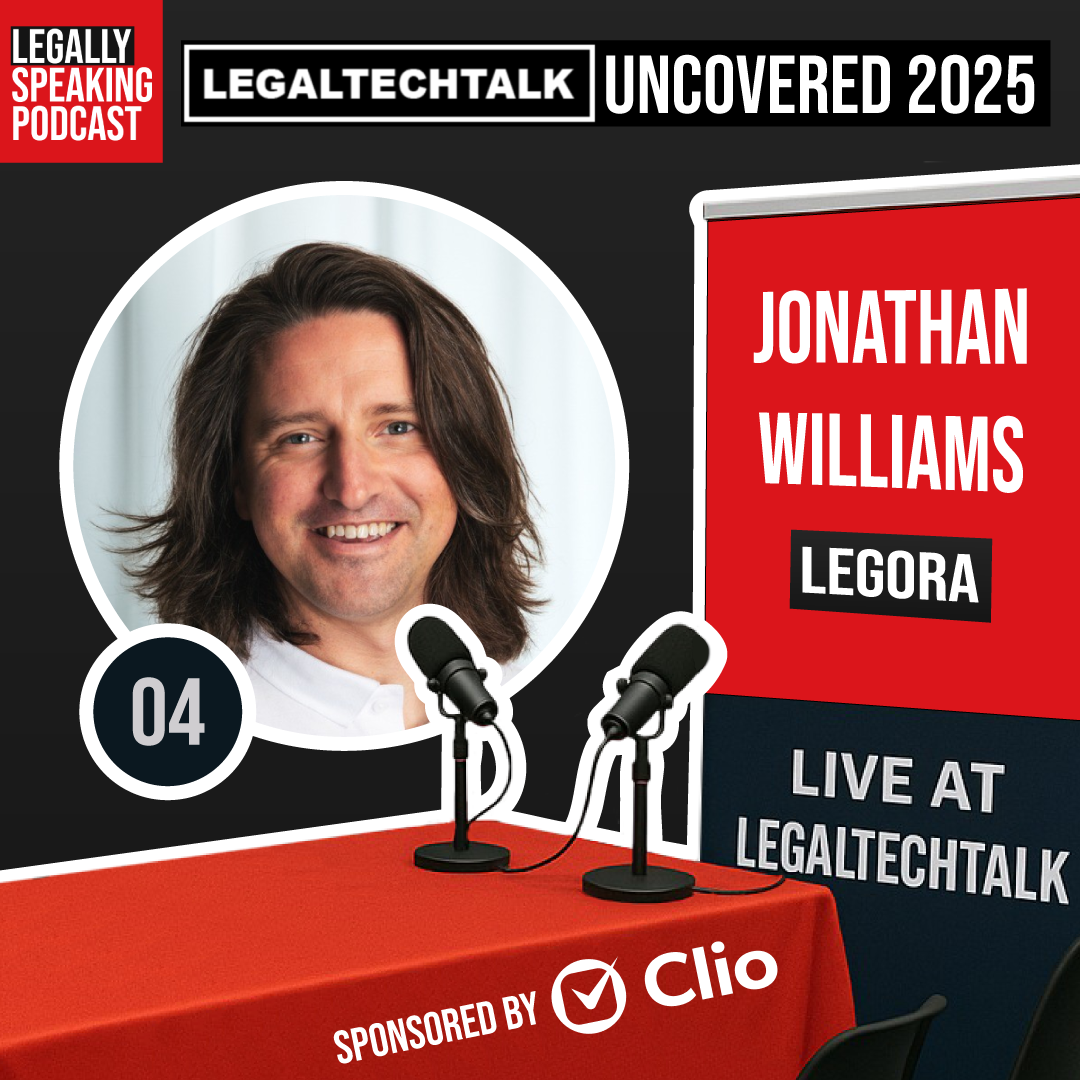
LegalTechTalk Uncovered 2025 – Jonathan Williams – E04
On today’s episode of LegalTechTalk Uncovered 2025, we speak to Jonathan Williams of Legora, an agentic

This week on the Legally Speaking Podcast, our host Rob Hanna is joined by Anuj Desai.
Anuj is the host of Europe’s leading cannabis industry podcast, The Cannabis Conversation. He is a qualified lawyer having worked in a variety of senior roles in the UK media industry over 15 years and continues to be a freelance legal consultant as well as an entrepreneur and investor in the cannabis sector. Anuj has developed, and continues to expand, an extensive network in the cannabis, CBD, cannabinoid and hemp sectors, both in the UK and internationally.
Anuj talks through his inspiring entrepreneurial and legal journey plus showcases the power of podcasts. He shares his learnings from hosting a highly popular niche podcast and a number of interesting insights into the wider Cannabis industry!
[0:00:00.0] Rob Hanna: Welcome to the Legally Speaking Podcast powered by Kissoon Carr. I’m your host Rob Hana. This week, I’m delighted to be joined by Anuj Desai. Anuj is a host of Europe’s leading cannabis industry podcast, The Cannabis Conversation. He’s a qualified lawyer and he worked in a variety of senior roles in the UK media industry over the last fifteen years and continues to be a freelance legal consultant as well as an entrepreneur and investor in the cannabis sector.
Anuj has developed and continues to expand an expensive network in the cannabis CBD and had sectors both in the UK and internationally. So, a very big welcome, Anuj.
[0:00:43.0] Anuj Desai: Hi guys, how are you doing?
[0:00:44.3] Rob Hanna: Yeah, very well thanks. Very well, I must say I’m looking forward to our chat. If I didn’t have a Legally Speaking Podcast, I think a cannabis one would probably be my second preference. But before we go through all of that. We do have an icebreaker question on our show.
So, you may or may not be aware, but we ask every guest to rate on the scale of one to ten, ten being very real, how real they rate the hit TV series, Suits. On the scale of one to ten in terms of its reality.
[0:01:16.6] Anuj Desai: Oh. It’s one that I’ve swerved, and I’ll tell you why, because it looks too kind of fake to me. But look to answer your question, I think I’ve seen a few minutes of it. Everyone is very beautiful, and everyone sort of works with very sort of powerful strikes. So, it was kind of bit of a no-no to me.
[0:01:39.8] Rob Hanna: So, on balance you’d probably give a zero?
[0:01:44.1] Anuj Desai: Yeah, but you know, what? Maybe that’s life in the US law firm, I don’t know.
[0:01:48.5] Rob Hanna: Who knows, who knows? Well, listen you’ve had a wonderful, you know, successful career. And we’re going to dig in to more of that. But let’s go back a little bit, tell us a bit about your family background and yes, just a bit about you first.
[0:02:00.7] Anuj Desai: Oh, wow. Okay. Well, I grew up in North London, and I went to Bristol Uni long, long time ago, which was great. I didn’t do a law degree; I did economics and history and I graduated, and I didn’t really know what to do. And I got few jobs in media because media sounded good even though I didn’t know what it meant.
And so, I just tried to find my feet. And then I find this actually quite a common theme amongst lawyers I speak to, but I kind of didn’t know what else to do. So, I just wanted to go back to school and I did the law conversion course, and during that time, I didn’t get a training contract because I had a 2:2 from Bristol.
And as we all know that’s a particular challenge when it comes to getting a training contract. So, I was a bit struggling but some reason, I don’t know if I’d do this again, actually if I was speaking to my 20-year-old self. But I took out huge loans to go and do the kind of conversion and the LPC without a training contract.
I managed to get a paralegal job at Universal Pictures whilst doing my LPC and getting the experience I think that helped to overcome the 2:2 and then I managed to get a training contract with a firm called Olswang who are now part of CMS.
[0:03:22.8] Rob Hanna: Yeah, tell us about your time there because yeah, I mean, Olswang would have been a very different firm to what it is now with obviously Nabarro and the beast that is CMS, but tell people – we have a lot of junior listeners listening in. So, tell us about your time training there and how you found it.
[0:03:35.7] Anuj Desai: Yeah, so even when I joined which would have been 2004 or five, I think, it already started. So, it was initially a kind of boutique media practice, and had lots of sexy film clients and all that kind of stuff. And even when I joined, it started to sort of get more corporate because I think the thig is, with firms who have a kind of a boutique niche area is there’s only so far they can grow.
And then in order to sort of start charging more fees, they need to start doing more corporate work and that’s what Olswang did, and it started – had a fairly decent real estate practice as well. And so, and as that happens and the fees go up, it means that they – you can’t really keep your kind of earlier clients, because they just – they can’t afford those massive fees.
So, there was a change even when I was there and that’s definitely happened now. It’s part of a really big firm now but I really enjoyed it, it was a fun place to be, but when I qualified in 2007, I really wanted to do TV work and they didn’t really have that much TV work. The main media work they were doing was for very big companies and it was kind of corporate support and outsourcing.
They still do media work, I’m not going to say that they don’t, but it was, you know, it wasn’t kind of working with independent producers and all that sort of stuff which I was quite interested in. So, I moved on qualification, but I had a great time there and I spent six months on secondment at the BBC which was a brilliant experience.
Because I’d gone from six months in banking which if anyone listening who’s done a seat in banking will know that you don’t really get to see your home much, you just get very well acquainted with a photocopier. And so, I had six months of that and then I went to the BBC which is – couldn’t have been more opposite.
I had a massive office of my own, I had a TV and a monitor on the desk, it was the World Cup and Wimbledon and yeah, it was…
[0:05:39.7] Rob Hanna: How did you fit all in?
[0:05:41.4] Anuj Desai: Exactly – so yeah, no it was great. It was great. And made lots of friends and yeah, I think training contracts are – they are very hard work, there is a camaraderie and a, you know, kind of university element to it because you were kind of roughly around the same age mostly and you were all in it together and you’ve formed some good bonds and I’m still friends with some of the people I was training with.
[0:06:06.0] Rob Hanna: Yeah, and you’ve worked with so many amazing brands, you know, from TalkTalk, HMV, BT etcetera on a whole host of different things, you know, what’s it like working with some of the big brands from a legal capacity. What insights can you share and some learnings?
[0:06:22.1] Anuj Desai: Well, I mean they’re all companies at ends at day and yeah, I mean look, they’re corporate institutions and – I mean, it kind of says a lot about my career that generally, I kind of wanted to move away from that. And then I had – like I said, I had a good experience, good training and you learn a lot but my natural inclination isn’t towards the sort of the big, big corporate places because they’re just less flexible.
And there’s an element of more security but you – just because they’re so big you can get quite siloed, I think. So, they’re great for exposure to big ticket kind of deals and stuff like that. And you know, if that’s what motivates you, then great. For me, I like the more rough and ready smaller businesses.
I – this is kind of in part what I’m doing now, but I was always sort of trying to go for smaller companies where I had more of an influence and also, I was able to do more things in just a very kind of – very structured legal role, if that makes sense.
[0:07:26.9] Rob Hanna: Yeah, and you very much are that entrepreneur because you know, throughout your career, you have founded businesses and you’ve kind of launched and set up sort of law firms, so let’s just talk a little bit about that because you had your health and fitness business that you kind of founded. So, how did you get about that?
[0:07:42.6] Anuj Desai: That was just an idea with a friend of mine and probably the key role in my career was when I was group head of legal at Blinkbox and the reason why that was quite key was, that was working with a couple of entrepreneurs and the business was owned by Tesco, so we had this kind of startup within a massive organization to say we had a very kind of deep pocketed parent company behind us. But it was very much entrepreneurs running it from the day-to-day perspective. So, you know, we did lots of kind of interesting things, trying to break the rules a bit and it wasn’t you know, a very kind of strictly legal role, I did a lot of commercial work and I was sitting on the management team.
So, I got to really learn about how businesses work and how they all sort of fit together. So, you got tech team, you got marketing, your HR, and all of those different departments, they had different idiosyncrasies and different ways of working. So, I learnt a lot about how actually to run an effective company, you’ve got to actually manage all of these relationships and you kind of keep everyone moving in the same direction.
And I – it kind of inspired me to sort of try and figure out something myself. And so, Blinkbox got sold to TalkTalk and I actually moved out of law into a commercial role, and I enjoyed the commercial role, I just wasn’t that much of a fan of the business, and particularly because TalkTalk wasn’t really in the media game. It kind of had a media business, it had a TV platform, but it was really not looking at it at all seriously. So, there wasn’t really a future there and I left and I just thought why not give it a crack you know, I’m kind of getting towards the end of my 30’s and I’ve learned a few things. So, I’ll give it a go and so, we set this business up and it was a health and fitness business for over 50’s and I loved it, it was really hard and it was not something that was going to go on long term.
And this was a key learning as well. Relationships in startups are very key and I don’t think myself and my mate were – we were really good friends; I don’t know if we were necessarily good business partners. But we called it early, you know, we had a frank chat and said, “Look, let’s remain friends and not spoil it with this business.”
But that kind of gave me the bug and it meant that anything I was looking for after that was – it had to be a bit entrepreneurial. So…
[0:10:16.2] Rob Hanna: And that brings us onto then, you know, The Cannabis Conversation, you know, hugely successful podcast, you know, well over 30,000 downloads, like you really are making massive strides in that sector. But again, I always like to understand people’s motivations and why – how did that sort of come out and why did you want to have your own podcast in that space?
[0:10:36.4] Anuj Desai: Yeah, I mean it’s a good question and I haven’t really done anything kind of outwardly creative before, and actually as a lawyer, I probably just assumed, I’m a lawyer therefore I am inherently uncreative. Because I mean lawyers don’t like to take risks and sort of creative things are, you know, they are not perfect.
And I think, as lawyers we all sort try and, you know, eliminate risk. So, this was, you know, I didn’t know what would happen etcetera but, to take myself back to it, I got interested in the space and an old colleague of mine, who is quite prominent had set up a few businesses. He invited me to a couple of conferences, and I went along. I wasn’t quite sure what to expect. I was either thinking it would be like, “Lots of kind of real money men who are sort of exploiting the situation” or it would be like these crusty huppies and tied eye t-shirts and all this stuff. And actually, it was none of that, I mean it was a bit of the money men bit and there was a little bit of the kind of hardcore activist but it was actually a lot of patience.
So, it was – I mean, those were some of the profound talks I went to, where you’ve got – there was a brilliant talk where there’s a woman called Chelsea Leyland who’s a kind of DJ, she suffers from epilepsy and her sister suffers from very chronic epilepsy. And she’s just making a film at the moment.
She hosted a stage, and it was woman who had really severe chronic pain, there was a guy in his 70’s whose wife had just passed away from MS, who had been treating with cannabis. And there was Charlotte Cornwall whose son Billy Caldwell has very severe form of epilepsy and was in part reason that the law got changed in 2018 to allow medical cannabis. And I was just –
[0:12:29.8] Rob Hanna: Just a question, just to cut in there. Just for people listening in, it’s the obvious question, but is cannabis legal in the UK?
[0:12:35.6] Anuj Desai: So, medical cannabis is legal under sort of very strict circumstances, so technically it is or it’s okay if you were able to get it prescribed. But in practical sense, it’s very hard to get hold of it because – just because of the hurdles you’re going to go through to get it prescribed. Or it is very expensive, so you can go to a private clinic, I mean that’s not obviously available to most people.
So, yeah that’s the high-level legal status of cannabis. Medical cannabis is technically allowed in certain circumstances, recreational is obviously illegal. Yeah, so to take a step back, so I saw these guys talking about and it’s really, really real problems and how cannabis was helping treat these people both in an underlying perspective but also sort of giving them better quality of life because of managing their pain etcetera. And that’s what kind of got me into it. So, I was like, “Wow, this is more than just, you know, bunch of stoners, there’s something real here.” And so, I had to read more about what was happening across the world. Canada went fully legal recreationally not long after that. I think it was the end of 2018.
And so, there’s been a real movement, CBD is obviously very popular in – it’s everywhere. And so, I started to look at it, I wasn’t quite sure what I wanted to do, and I personally had been listening to a few podcasts myself and I found them a really good way in to understanding new topics. And you know, they’re kind of passive in nature, so you can listen to them on your commute or when you’re at the gym or when you’re doing other things. And they’re a great ways to get up to speed on new subjects. So, I thought there’s tons of cannabis podcast coming out in North America as you probably expect but there wasn’t really anyone doing it in the UK or in Europe.
So, I thought I’ll, you know, I’ll give this a go. It’ll be a great way to sort of go and meet people, you know, get a little bit of a profile, but many learn stuff. So I kind of, my attitude has been like, “Well, what do I want to know more about?” And then I find, if I can, the best qualified person to speak to and then, you know, that’s my interview.
[0:14:55.3] Rob Hanna: Yeah, I think. And I think – yeah, let’s call – I mean, you had some massive names come on to the show in the space. It was sort of internationally around, sort of cannabis activist, advocate you know, that founded some of the biggest names in the business. So, you know, what had been some of the most interesting insights you’ve learned from having these guests on the show?
[0:15:12.9] Anuj Desai: Well, see many – I mean, some of the most interesting ones I think, were the more sciency ones. So, when I am speaking to doctors or researchers. One of my favorites is a guy, it’s a guy, Professor Dedi Meiri, who’s from the Technion university in Israel. He’s probably one of the world’s leading researchers into cannabis as a treatment for cancer.
And the complexity of the plant but also the complexity or things that he’s studying are, you know, are huge. I mean, one of the things, you know, without singling anything out, the things I really enjoy is I’m learning new stuff about biotechnology, agriculture, you know, the human body, mental health, investment, capital markets.
You know, all these things that I didn’t – you know, in my kind of law – when I was a media lawyer, it was great. And like I said, I did learn a lot about business, but I’ve learned a lot about kind of how the global economy works just in this sort of last couple of years doing this podcast.
So yeah, it’s quite hard to pick out few things, but I too tend towards the science I think and it’s really, when you see how well a medical system is set up and it sounds all quite conspiracy theory and again quite hippy but the emergence of or the reemergence of plant0based therapies as medicine is really interesting to see. And you have to look to the opioid crisis in the US to see how a lot of pharmaceutical models and a lot of our modern-day medicine is based, you know, companies selling you a medicine. And whether it actually fixes your problem or not it’s sort of incidental, it’s about the fact that you’re a repeat customer who has to buy pills, you know, every week for the rest of your life.
And then the problems that comes with that. So, the whole movement towards more plant-based medicine is an interesting one. It’s quite difficult but this is much – it’s much less precise than the pharmaceutical model but, you know, it’s a kind of, you know, early stages with that. So, I kind of feel quite proud and happy to be part of this new movement which is bringing a lot of help to people who really need it.
[0:17:42.9] Rob Hanna: Absolutely. You’re on a really big journey, I mean you’re developing such a, you know, wide network, as I’ve mentioned, sort of it’s not just UK, it’s not just Europe, but globally in terms of the cannabis sector which is great. I mean, just in terms of some practical things, the medical cannabis, what’s that most commonly used for, just for people kind of listening in, just to get a sense of, you know, why it might be useful?
[0:18:02.9] Anuj Desai: Yeah, well I mean that’s again, it might be useful to sort of say that cannabis is made up of over 500 compounds and there are thousands of different strains, well yeah – at least a thousand but probably a several, different strains of cannabis and they all have different profile of ingredients in them, so they will do different things.
So, it’s not just like one – it’s not just one plant and that it, there’s huge variation. And so, different plants will do different things, the things that commonly what people are getting most excited about around pain and antispasmodic qualities. So, that’s sort of fixed into sort of epilepsy, sort of other things.
Then there’s CBD kind of being talked about in terms of anxiety and anti-inflammatory qualities as well. So, those are the main kind of areas, I hope I’m not forgetting anything there. Cancer is a really, really interesting one, and its bits around sort of palliative care. So again, looking at medicine in sort a of a different way, the quality of life aspect is quite big.
So, just generally you know, allowing you to live a more pain free life is key quality of a good medicine, and cannabis has been shown to help that. And with specific relation to cancer it’s in – and again, when I was speaking to Professor Meiri who I mentioned earlier, he is so complex and obviously with cancer everyone sadly is, you know, most people are affected by it in some way, there’s real hope there but he’s saying there’s a lot of research to kind of comment, really validate stuff but it’s been shown to sort of check your cancer cells, help with these side effects from chemotherapy, so nausea and lack of appetite, things like that. So, it can be used in all different ways.
But sorry, I’m trying to be brief but it’s such a massive topic that you try to totally bang on about it for a few hours.
[0:20:11.8] Rob Hanna: And that’s why people should definitely check out your podcast and listen to you at more details. It’s such an interesting topic. Just out of interest in terms of countries that you know, produce the medicine, I’m assuming the US but correct me, who are here are some of the major kind of producers that people in the UK are probably more aware of?
[0:20:28.8] Anuj Desai: The UK was the largest exporter of medical cannabis in the world or legal cannabis in the world. I’m not sure if that’s exactly true right now, but it certainly was up until about a year ago, and that’s because the biggest cannabis company in the world – well arguably the biggest at least one of the two is chemical GW farmer which is UK, it’s listed in the US.
And they have a couple of cannabis-based drugs which are FDA approved in the US but also approved in various jurisdictions around the world, and so, they’ve been around for quite a while and they’ve been patenting a lot of these medicines. So, you know, it would probably come as bit of a surprise that UK is the largest exporter.
Many other countries are – well, I mean they say the US, Canada obviously from a legislative perspective but also Canada allowed companies to float on the Canadian stock exchange. And that was huge because, whilst cannabis is federally illegal in the US, it’s legal in certain states to different levels.
But the federal provision of cannabis in the US means that it’s very difficult to access the banking system and so most companies in the US, you know, can’t get loans and do sort of normal things that companies do to expand. So, Canada opening up it’s sort of public markets, means that lots of companies have floated in Canada and have raised money that way.
So, that’s been significant, probably the biggest country in Europe is Germany in terms of – I think they got over 50,000 prescriptions, maybe 70,000. And Israel as I mentioned, Israel is very kind of leading in research. Australia… Thailand, I think is opening up in Asia. There’s lots of bits going on.
South America was actually really interesting as well, because it’s probably got one of the best climates to grow cannabis. Various bits in Africa there’s a lot of small nations that are seeing cannabis as a kind of stimulus to their economy. So, you’ve got Macedonia, Lesotho, Malta, so small countries are kind of opening up their systems to this in order to maybe steal a march on the bigger countries who are probably a bit more conservative and slower on the uptake.
[0:23:04.1] Rob Hanna: Yeah, no that’s really interesting. Thanks for sharing that. And as I mentioned, you had so many amazing guests in the space that you’re in on the show. How do you go about sort of selecting them and getting them on the show, and also, is there one guest that you’re kind of targeting that you would love to have on the show, that you kind of would just say that person would just really, really bring so much value to your podcast, just out of interest?
[0:23:27.4] Anuj Desai: So, I’ve been quite lucky. I’ve probably got a mix of people coming to me and me approaching them. I’ve now got a pretty decent network around the world so, most people I can get in touch with, not everyone says yes. But there’s a kind of nice mix about that Yeah, you know, I mean originally sort of set this up thinking I’ve got to teach the whole world about cannabis, what it sort of evolve into very much in industry podcast. Kind of B to B.
So, people who are either working in the industry or want to work in the industry. So, again a lot of young people who were probably, you know, either at university or graduates who were sort of looking, they were interested by CBD or medical cannabis and saying, “How can I get in?” And so, they’ve used the podcast as a way to learn about it.
So, it’s kind of naturally evolved there. And you know, originally, I would have been, “I want to get Snoop on the show, I want to get Mike Tyson” or whoever else. I’m not necessarily sure that would kind of fit with what I’m doing now. I’m less wowed by the celebrity. This week show that’s coming out on Wednesday with a guy called Dr. Ethan Russo who’s probably be one of the foremost sort of specialist in the world.
Huge, huge amounts of information. So, not necessarily well know but you know, someone I’m quite excited about having on.
[0:24:52.6] Rob Hanna: Yeah, and definitely be a thought leader and someone who can add loads of extra context to the show. And just in terms of anything else, is there any other sort of interesting fact about cannabis that maybe, you know, myself probably not aware of that, that would be quite cool to share.
[0:25:07.0] Anuj Desai: Well, I mean cannabis, obviously gets a lot of pressbook, but what I find more interesting is Hemp actually and so just for the listeners, benefit. Hemp is the cannabis plant but with a low level of THC. And THC is basically responsible for huge amounts of things but probably most famous for, it gets you stoned, it gets you high, it’s that effect.
So, it has lots of medical qualities as well but people really kind focus on the intoxication element of it. And Hemp is basically cannabis but with a very low level of THC in it. And it was historically used as a material in all kinds of things. So, it’s – I mean it’s throughout history. So, you know, the British navy used it in their sails and actually that’s where cannabis came from the word canvas because of that.
And actually, the prohibition of cannabis is largely due to Hemp. So, in the US, the oil industry and the paper industry kind of slightly colluded in the 1930’s to get Hemp outlawed, because it was – Hemp was used for everything. Henry Ford actually made a car, made it mostly out of Hemp, using Hemp fuel to power it. And so, you know, it’s got a lot of uses and it was, you know, it’s a threat to the paper industry and the oil industry and so, they kind of helped to scapegoat Hemp in with cannabis saying it’s a – and they used a really, really racist campaign as well. It was used a reason to kind of marginalize Mexicans and Blacks and anyone that the majority government in the US didn’t like at the time.
And it was actually mainly due to Hemp rather than actually cannabis. So, I mean that’s a massive topic on its own. The reason I find Hemp really interesting is because obviously people are looking at sustainable solutions now, and it’s an amazing crop, it’s secretes more CO2 than sort of actually any other crop. And it grows really quickly, so you know, in the right climate you can get two-three growth cycles in a year.
And countless other environmental benefits. So, as much as I am really interested in the medicinal qualities of cannabis and the wellness qualities of CBD for example, I think, you know, Hemp is a material as a substitute for you know, potentially things that are plastic, is really, really exciting.
[0:27:47.9] Rob Hanna: Yeah. And thanks so much for sharing that. Really, really interesting. So, I think just as we draw to a close because I’m sure this would have picked a lot of people’s interest, you know, how can people hear more about this? Do you want to sort of give a shoutout to the podcast? How people can listen and maybe get in touch with you in terms of your social media channels?
[0:28:05.7] Anuj Desai: The podcast comes out every Wednesday evening. It’s called the Cannabis Conversation. The website is www.cannabis-converstion.com and I’m mainly on LinkedIn and Twitter, I’ve got Instagram as well for stuff but LinkedIn is probably the main channel which is – like I said it’s more industry focused.
So, please come along and find my page on LinkedIn. So, the podcast comes out every week but I share a lot of articles not written by myself but the kind of best things that I read during the week and yes, that is great place to learn various things about it. Yeah, so please come along and check it out.
[0:28:51.0] Rob Hanna: Yeah, well listen Anuj, thank you so much for all those interesting insights. And I’ve learned so much, that I thought I knew a little bit about cannabis, but it transpires I don’t know anything. So yeah, I’m a big fan of your podcast, we’re going to be tuning in more regularly for sure. Thanks so much for that. It’s been an absolute pleasure having you on the show. And hopefully, we’ll have you back again in the future where we can find out what the state of the cannabis space is down the line.
[0:29:13.6] Anuj Desai: Yeah, absolutely. Would love to do that. Thank you, Robert.
[0:29:17.3] [Audio ends]
You may also tune in on Goodpods, Apple Podcasts, Spotify, or wherever you get your podcasts!
Give us a follow on X, Instagram, LinkedIn, TikTok and Youtube.
Finally, support us with BuyMeACoffee.
🎙 Don’t forget to join our Legally Speaking Club Community where we connect with like-minded people, share resources, and continue the conversation from this episode.
Sponsored by Clio – the #1 legal software for clients, cases, billing and more!
💻 www.legallyspeakingpodcast.com
📧 info@legallyspeakingpodcast.com
Disclaimer: All episodes are recorded at certain moments in time and reflect those moments only.

On today’s episode of LegalTechTalk Uncovered 2025, we speak to Jonathan Williams of Legora, an agentic
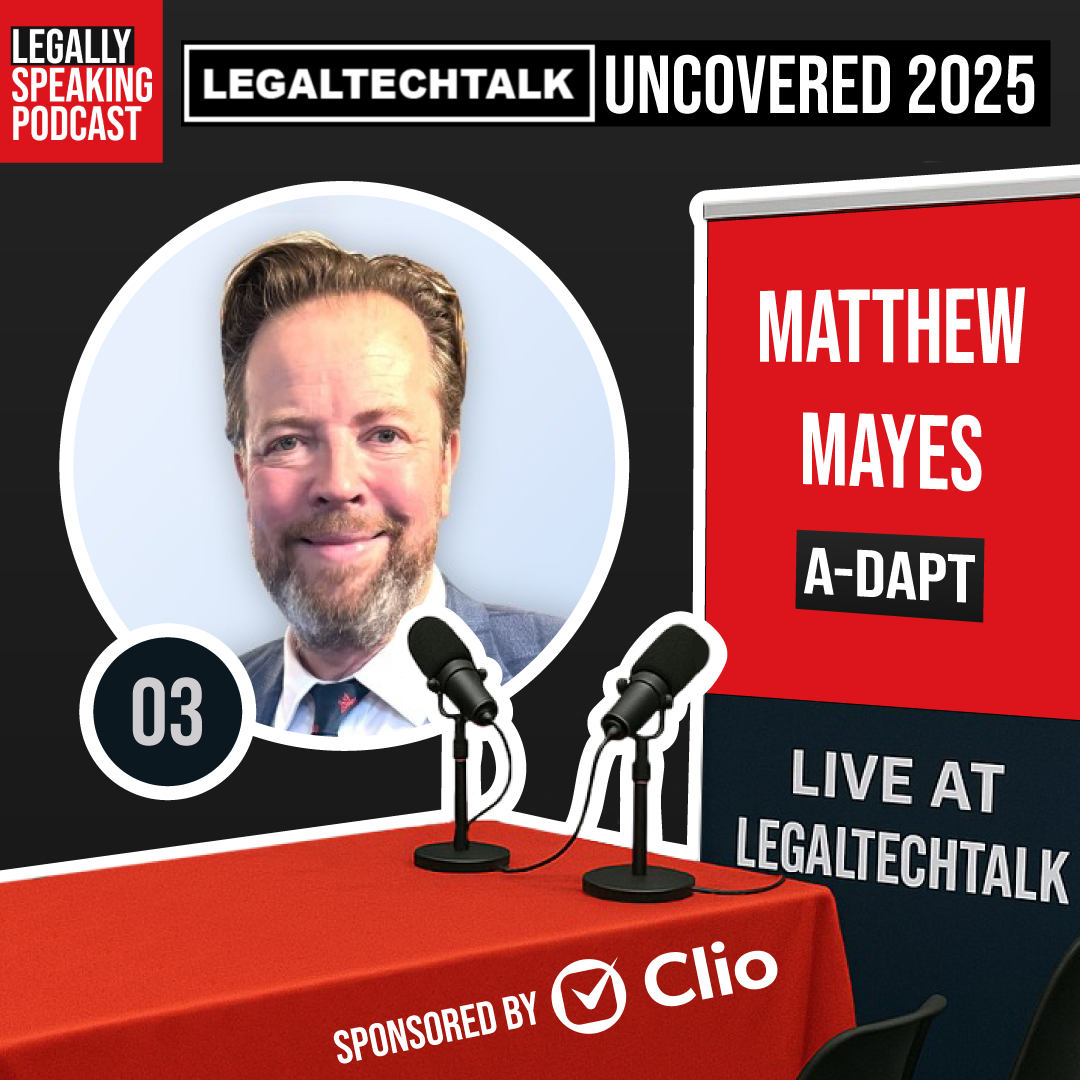
On today’s episode of LegalTechTalk Uncovered 2025, we speak to Matthew Mayes. He is the co-founder
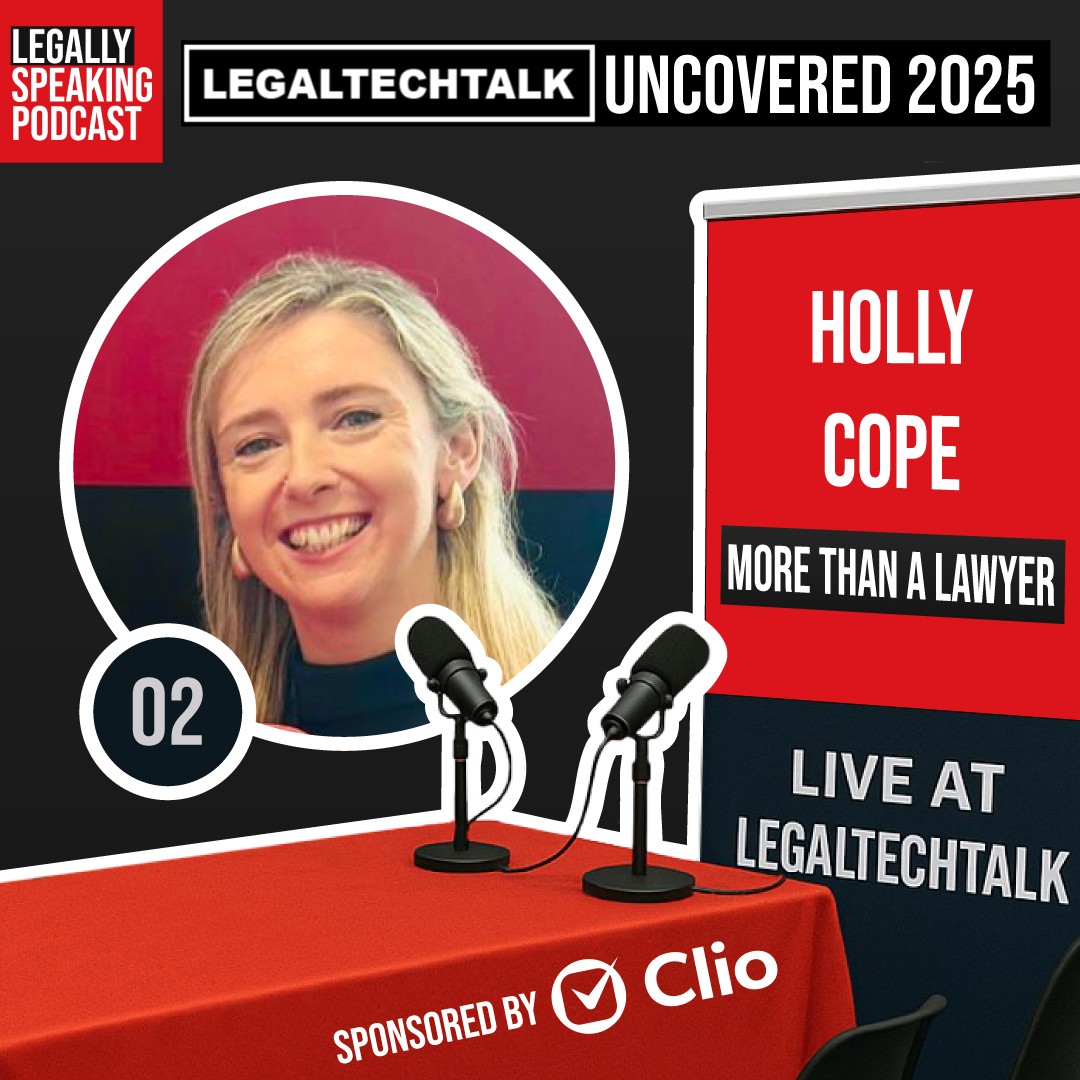
On our second episode of LegalTechTalk Uncovered 2025, we speak to Holly Cope. She is the
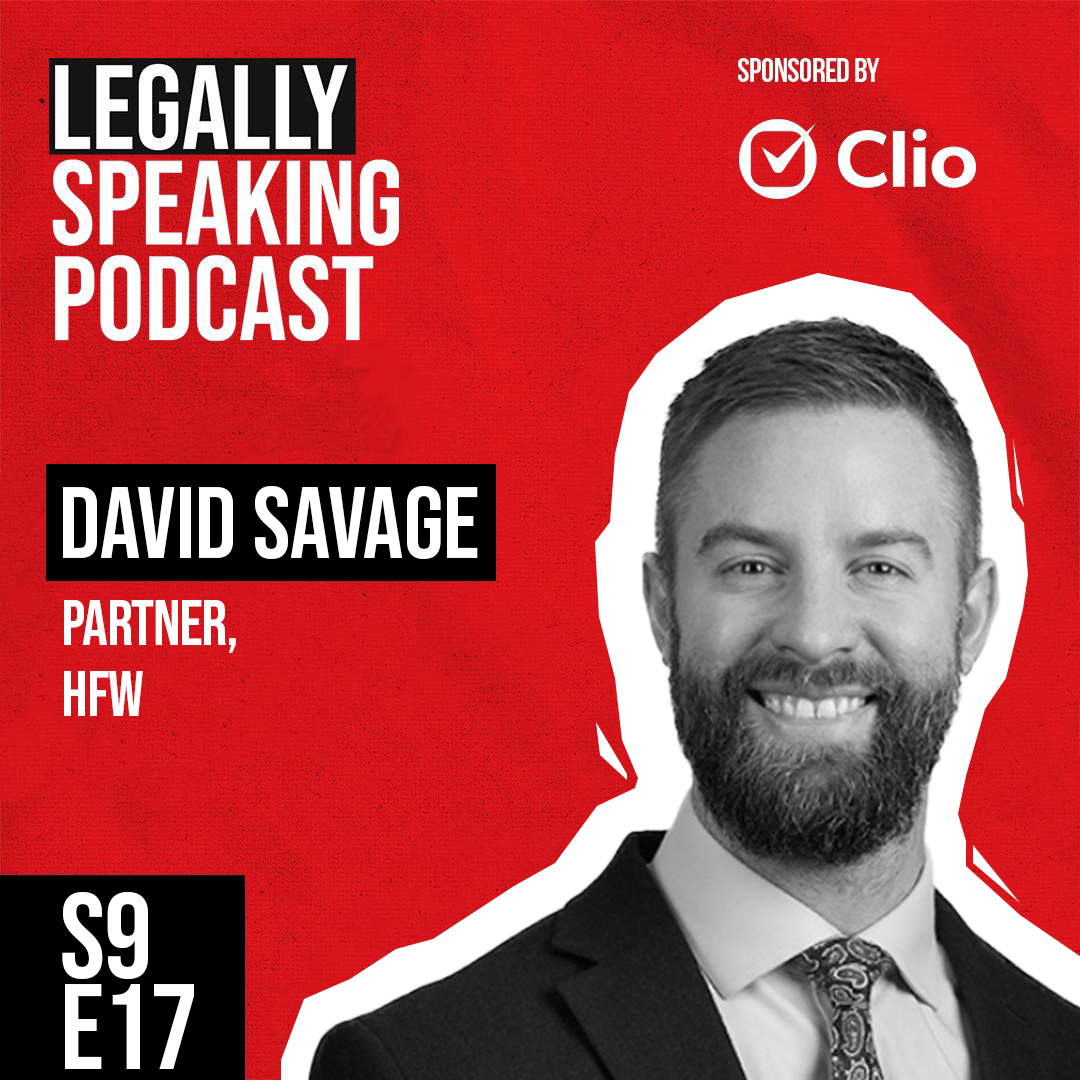
Fraud, corruption, money laundering, how do the world’s top lawyers tackle financial crime at the highest
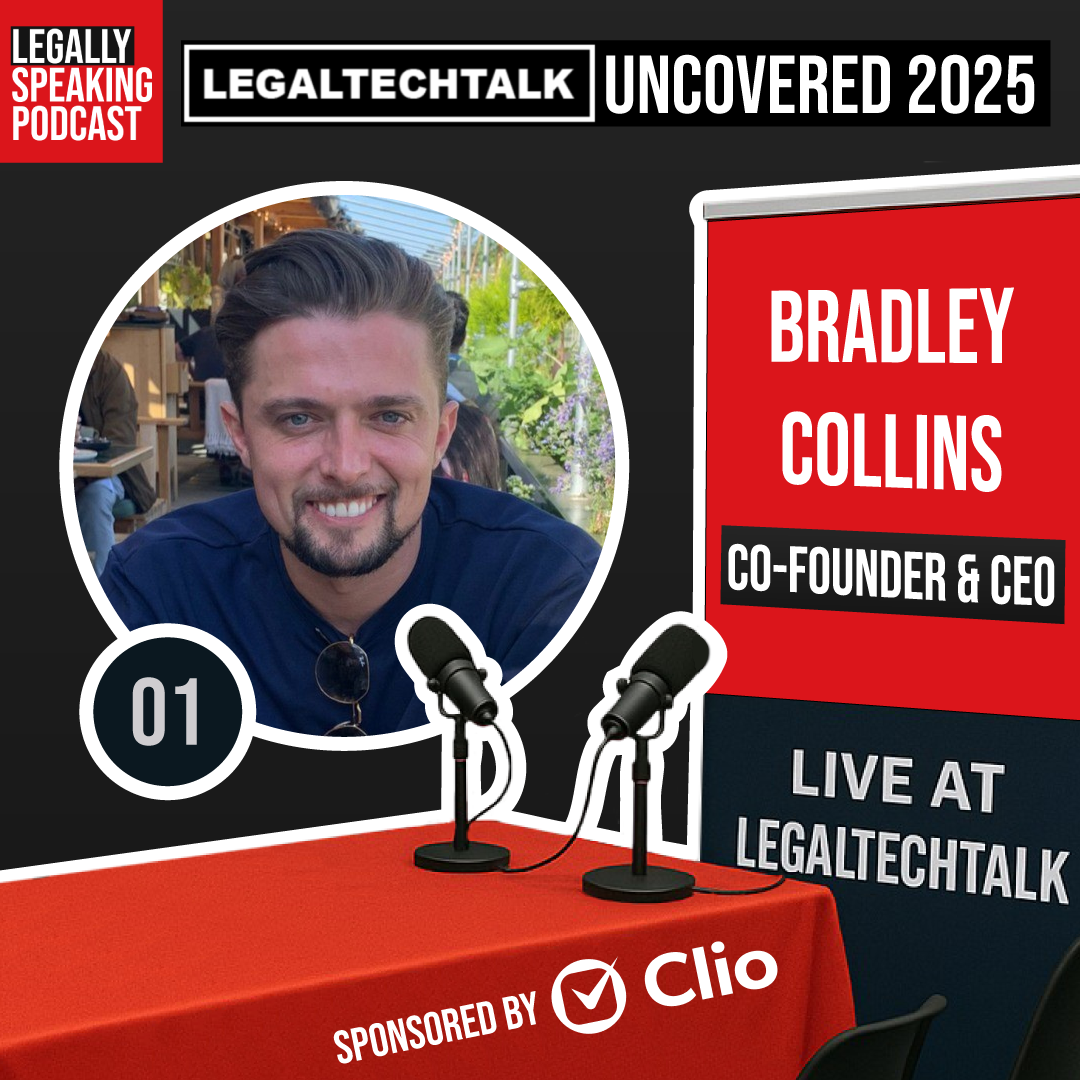
🚨 BREAKING NEWS: CEO of LegalTechTalk Shares What You Can’t Miss at #LTT25 🚨 🎤 This
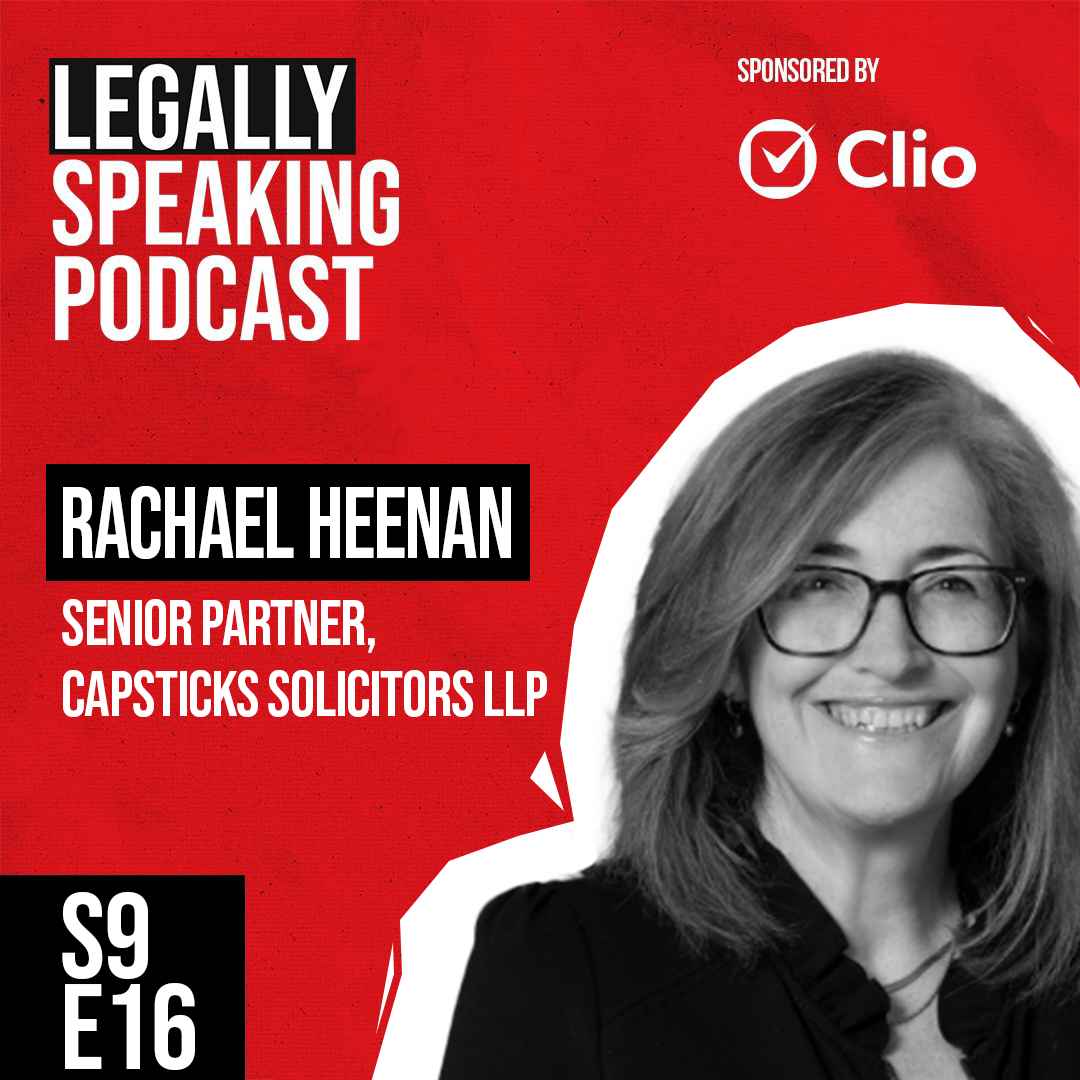
On today’s Legally Speaking Podcast, I am delighted to be joined by Rachael Heenan. Rachael is

*DISCLAIMER* All episodes are recorded at certain moments in time and reflect those moments only. The podcast does not support or associate itself with any inappropriate behaviour or actions that may have occurred after recording.